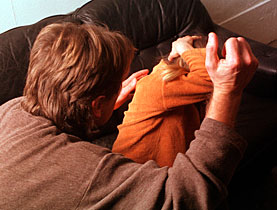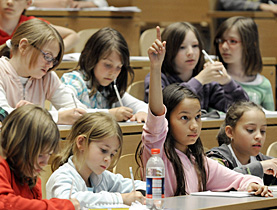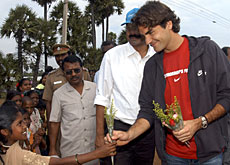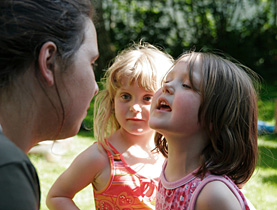Call to outlaw corporal punishment of children

The Terre des Hommes children's rights organisation has called for more public debate in Switzerland on the issue of children and corporal punishment.
It highlighted the problem at a national colloquium in the capital, Bern, pointing out that Switzerland was not among the 19 European countries that have completely banned the practice.
“If you beat a dog it is mistreatment, if you beat an adult it is a criminal offence but if you beat a child it’s considered in the family as being for the child’s own good,” noted Elda Moreno from the Council of Europe’s Children’s Rights Committee. “We want to get rid of this perverse idea.”
Most participants at the meeting could not accept that a parliamentary initiative called “Improved Protection for Children against Violence” put forward last December by Social Democrat Ruth-Gaby Vermot-Mangold was rejected by the House of Representatives with the argument that children were protected adequately by current legislation.
For child protection specialist, psychologist and teacher Franz Ziegler this argument does not hold water: “Why should we be able to beat our children but not adults?”
Helplessness
Ziegler interprets the corporal punishment of children as the expression of helplessness: “Not only that, it is also the expression of backward thinking.”
Jean Zermatten, vice-president of the United Nations Committee on the Rights of the Child, said it was peculiar that at a time when there was intensive debate on youth violence, corporal punishment of children was still tolerated.
And he added exactly what he understood by corporal punishment. It was any punishment which involved bodily violence, including slaps in the face, kicks, shaking, pulling on hair or ears and, for example, ordering the child to remain in an unpleasant position, eat soap, or scald it.
Zermatten, a Swiss, also said punishment should not be degrading. He mentioned non-body violence which was outlawed by the UN Convention on the Rights of the Child – insults, humiliation and making someone appear a fool.
“A child is also a complete person. It too is entitled to inalienable human rights.”
Mali Nillson from the Swedish aid agency Save the Children told swissinfo.ch why the situation in her country was so very different from that in Switzerland.
“Good upbringing”
In July 1979 the following passage was included in Swedish legislation: “Children are entitled to care, security and a good upbringing. Children are to be treated with respect for their person and individuality and may not be subjected to physical punishment or other injurious or humiliating treatment.”
As the legal amendment was made to the Parents’ Code, it carries no penalties. Punishment for infraction of the law remains within the arena of the Penal Code and is administered only in cases that meet the criteria of assault.
Nillson said this seems to have had positive results. In the 1960s most children in pre-school age were beaten once or several times a year, a third of them regularly.
In the 1970s less than 50 per cent of the children were beaten. According to national studies, 51 per cent of parents in 1980 said they had used corporal punishment the year before. The figure went down to four per cent in 2006.
Nillson said as a result of the positive developments in Sweden she could not understand why Vermot-Mangold’s parliamentary initiative had been rejected.
Protection
“It is really a pity that [Swiss] parliamentarians did not react more humanely regarding children’s rights. They should see to it that that laws are made that guarantee an upbringing in which children are protected as much as possible.”
She added that other factors helped the situation in her country, notably much public discussion on the issue.
Nillson would like to encourage people to stand up for children and support them.
“It is [also] important to protect other children outside the family. It’s not that we want to incriminate the parents but we want to support families before something really bad happens.
“We must also show children who are mistreated that not all parents are bad. [But] violence is simply not acceptable.”
Etienne Strebel, swissinfo.ch. (Adapted from German by Robert Brookes)
According to a study by Fribourg University in 2004, about 1,700 children living in Switzerland aged up to 2 ½ were regularly hit with objects, while 13,000 children in the same age group were slapped or smacked and about 35,000 spanked.
According to the UN’s children’s organisation, Unicef, Switzerland lies in 15th place (of 27 industrialised countries) concerning child abuse.
According to a survey taken in 2005 by the German-language Facts magazine, 75% of adults in Switzerland said they were in favour of slapping as a means of education.
Corporal punishment against children in Swiss schools has long been forbidden – but not in the family.
International bodies such as the UN Committee on the Rights of the Child or the UN Human Rights Council have called on Switzerland to ban corporal punishment against children.
The Swiss House of Representatives rejected Vermot-Mangold’s parliamentary initiative called “Improved Protection for Children against Violence” in December 2008.
With her initiative Vermot-Mangold had wanted specifically to protect children against corporal punishment within the family.

In compliance with the JTI standards
More: SWI swissinfo.ch certified by the Journalism Trust Initiative



You can find an overview of ongoing debates with our journalists here . Please join us!
If you want to start a conversation about a topic raised in this article or want to report factual errors, email us at english@swissinfo.ch.